The Other China
人妖之間
In the following interview, Robert Daly, veteran diplomat, specialist in US-China relations, linguistic talent and a man of faith, observes that:
The faith question is hard to answer, but it may be what inclines me to view China in a humanistic context. We [i.e., the United States] now view China, almost exclusively, as a security threat, but we used to approach it in a spirit of curiosity, with fellow-feeling and openness to the new. The view of many of us who have lived in China for years, and who have experienced its complexity and dynamism, is that we should give as much attention to the welfare of individual Chinese as we do to our security concerns. What Xi has made of China is heartbreaking as well as dangerous.
Readers of China Heritage will know that, while we appreciate optimistic views of the recent past, we do not entirely share them. After all, as we have previously pointed out, this year, 2023, is the fortieth anniversary of the Chinese Communist Party post-Mao efforts to reject humanism and the role it could have played in its economic reform program. Although the formal campaign against Western influence and heterodox Marxist ideas petered out in late 1983 and early 1984, the Anti-Spiritual Pollution Campaign had a long-lasting effect on Chinese thought, politics and life. It is one that continues to the present day (see Ah, Humanity!, the first part of The View from Maple Bridge, chapter twenty-four in our series Xi Jinping’s Empire of Tedium, 5 February 2023).
***
This following discussion of frustrated humanism and the abiding spirit of decency that is not suborned by narrow politics, marks Robert Daly’s comments on Xi Jinping’s China off from the pelagic vastness of much of the flotsam and jetsam produced by China watchers, analysts, academics, and pontificators of all persuasions. Among other things, I was attracted to this interview because Daly mentions both The Importance of Living, by Lin Yutang, and Simon Leys, the pen name of Pierre Ryckmans.
My lifelong interest in ‘Chinese humanism’ was sparked when I read my mother’s copy of Lin’s book in my mid teens. A few years later, I studied Chinese under Pierre Ryckmans in the early 1970s. This was followed by some years in Maoist China. It was a land riven by political fury, xenophobic rancour and class hatred.
I have grappled with those contrasting versions of and visions for China for over half a century. This ‘Janus mien’ would be the focus of my doctoral work, supervised by Pierre Ryckmans, in the 1980s and the resulting book, An Artistic Exile, is my account of the potential and failures of Chinese humanism and an alternative Chinese modernity in the twentieth century. A similar theme runs though my other work, including the books Seeds of Fire (1986), New Ghosts, Old Dreams (1992), Shades of Mao (1996) and In the Red (1999). It also underpins our analysis of the vanquished middle ground during the 1989 Protest Movement as presented in The Gate of Heavenly Peace, a 1995 documentary film for which I was a lead writer and senior academic adviser.
As Robert Daly notes below, the conflict between these ‘two Chinas’ is more incendiary today than it has been for many decades.
***
Readers of China Heritage will be aware that my life in China has taught me to be cautious of the lure of ‘hopium’ and over the years I have also built up something of a visceral resistance to the beguiling effects of ‘hopioids’. Optimistic delirium has nonetheless buoyed many observers, protagonists and informants within the People’s Republic itself. Elsewhere, I have even dubbed the Hopioid Addicts forced to go cold turkey during the Xi Jinping decade as ‘The Disappointed’.
Therefore, during the 1990s and 2000s I never belonged to the ‘China was liberalising, engagement was working’ school of thought (see: Prelude to a Restoration; Red Allure & The Crimson Blindfold; and, You Should Look Back).
To the contrary, in my study of the popular new Mao cult of the early 1990s, Shades of Mao, I noted the relevance to China of the famous observation that Marquis de Custine made about Russian autocracy:
Sovereigns and subjects become intoxicated together at the cup of tyranny …. Tyranny is the handiwork of nations, not the masterpiece of a single man.
In a series of five commentaries on an American White Paper on China published in late 1949, Mao Zedong denounced China’s liberals and democratic individualists 民主個人主義 for their pro-Western stand. They, along with the humanistic values that they espoused, Mao declared, had been cast aside by history. In 1978, Deng Xiaoping and his comrades reaffirmed that judgement, as well as in 1983 and again following the Beijing Massacre of June 1989.
[Note: For Mao’s ‘canonical’ commentaries, see:
- Cast Away Illusions, Prepare for Struggle, 14 August 1949
- Farewell, Leighton Stuart!, 18 August 1949;
- Why it is Necessary to Discuss the White Paper, 28 August 1949;
- “Friendship” or Aggression?, 30 August 30 1949; and,
- The Bankruptcy of the Idealist Conception of History, 16 September 1949.]
The past is not a foreign country. Mao’s essays remain essential reading and today Xi Jinping echoes Mao’s old message, emulates his bitter rhetoric and amplifies his ideas.
***
Nor do I entertain a romantic view of ‘the Chinese people’ (nor, when it comes down to it, do I put much store in the masses of most other modern nation-states). I am keenly aware of the pervasive impact of Beijing’s state-run mass media, the bias, stentorian declamations and emotive hyperbole of which puts Fox News in the shade. And none of us should ignore the impact on China of an educational system that has, for over seventy years, offered up a version of modern history that for the most part fuels resentment and stokes revenge.
When it comes to the future of China, even one without Xi Jinping, as well as the prospects for the US-China relationship (one that includes US allies like Australia and New Zealand), I am reminded of Susan Sontag’s observation that:
10 percent of any population is cruel, no matter what, and 10 percent is merciful, no matter what. The remaining 80 percent could be moved in either direction.
Like-minded people seeking fellowship in an era experiencing ‘changes not seen in a hundred years’ can always find refuge in ‘The Invisible Republic of the Spirit’.
***
I am grateful to The Wire China for permission to reprint this interview and to Robert Daly for his support. I am also pleased to have an opportunity to feature the work of Scott Savitt, whom I first encountered in Beijing in the late 1980s. Scott encouraged me to write for Beijing Scene, his daring creation, in the 1990s and it was through that collaboration that I met Jeremy Goldkorn, a friend with whom I have worked ever since.
My thanks to Don Keyser for alerting me to this interview.
‘Keeping Close to China’ is reprinted as a chapter in The Other China. and included as an appendix in the series Xi Jinping’s Empire of Tedium.
— Geremie R. Barmé
Editor, China Heritage
20 October 2023
***
Further Reading:
- The China Critic, China Heritage Quarterly, June/September 2012
- Barmé, In a retro mood, The China Project, 15 September 2023
- Jianying Zha 查建英 & Katō Yoshikazu 加藤嘉一, Adieu, China! — Jianying Zha’s Long Farewell, 10 November 2020
- Jianying Zha 查建英 & Geremie R. Barmé, The Spectre of Prince Han Fei in Xi Jinping’s China, 6 May 2021
- Mangling May Fourth 2020 in Washington, 14 May 2020; and, Mangling May Fourth 2020 in Beijing, 8 May 2020
- Chas W. Freeman, Jr, The State of the Sino-American Pas de Deux in 2021, 20 February 2021
- Kissinger Scores a Century, 27 May 2023
- Spectres & Souls — Vignettes, moments and meditations on China and America, 1861-2021
- Watching China Watching
- The morality of U.S.-China policy, The China Project, 12 October 2023
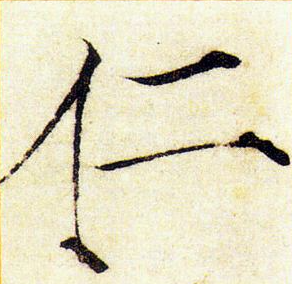
***
Robert Daly on Keeping Close to China
The head of the Kissinger Institute talks about the worrying signs of racism in the U.S.-China relationship and Xi Jinping’s errors of judgment.
Interview by Scott Savitt
15 October 2023
Robert Daly is director of the Kissinger Institute on China and the United States at the Woodrow Wilson Center for International Scholars. He has 35 years’ experience working on political, cultural, and academic aspects of U.S.-China relations. He began his China career as Cultural Exchanges Officer at the U.S. Embassy in Beijing in the mid-1980s and early 1990s. After leaving the Foreign Service, he taught Chinese at Cornell, worked on television and theater projects in China as a host, actor, and writer, and helped produce the Chinese-language version of Sesame Street. He is a director of the National Committee on U.S.-China Relations and American Mandarin Society and a member of the Task Force on U.S. China Policy. Mr. Daly has interpreted for Chinese leaders, including Jiang Zemin, and American leaders, including Jimmy Carter and Henry Kissinger. He lived in China for 12 years.
Question: Given your extensive experience with U.S.-China educational exchanges — and the current hostility between Washington and Beijing — what role do you see scholarly exchanges playing in the future?
Anwer: We have to start by recognizing that educational exchanges were never very good, in that they were lopsided. There were far more Chinese students coming to the United States than Americans going to China. There were never that many Americans taking the study of China or the Chinese language seriously. The numbers were misleading because they included college students who were taking one- or two-week trips to China in the summer — quasi-academic tourism. And they never went back and never looked at China again. So when you see statistics that had Americans studying in China in the tens of thousands annually, that’s misleading. There is little comparability between what American students were doing in China and what Chinese students coming to the United States were doing.
***
Biography at a Glance
Birthplace
Age
Current Position
Bossier City, Louisiana
61
Director of the Kissinger Institute on China and the United States at the Woodrow Wilson Center for International Scholars
***
Now the number of Americans studying Chinese in the United States and going to China has — I don’t know if you can “plummet” from a very low height — but it’s now very low. That trend predates the current troubles. It began with intensive American reporting on Chinese air pollution in 2008-09. That’s when the numbers took a big drop. So it’s due to air pollution, trade war, COVID — and now Cold War dynamics in the relationship, with the result that not only potential students, but their parents, read nothing about China but its potential dangers.
China is becoming hostile to foreigners within its borders. This trend has been given a big boost by Xi Jinping’s revision of the counter-espionage laws, which tell Chinese to view all Americans in China – all foreigners in China and all Chinese who interact with them – as spies until proven otherwise. That, combined with hostage diplomacy, the two Michaels [Kovrig and Spavor, Canadians who spent three years in Chinese prison while Huawei’s chief financial officer Meng Wanzhou awaited an extradition decision in a $20 million home in Vancouver], and the increase in exit bans, creates a hostile environment. If you go to the U.S. State Department website and look at its travel warnings, you’ll be advised to “Reconsider travel to China.”
***
Miscellanea
Book
Favorite Musician
Favorite Film
Most Admired
The best explication of all that is glorious and admirable in the Chinese tradition is still Lin Yutang’s 1937 The Importance of Living
Tom Waits
Slapshot (1977)
Simon Leys
***
This is tricky. On the one hand, China deserves the travel warning because of hostage diplomacy, counter-espionage paranoia and exit bans. Less reported is the fact that most of these activities in China are racialized. Most of the people who are subject to exit bans or arbitrary detention are ethnic Chinese business people from all over the world, with foreign citizenship, who happen to have Chinese ancestry. The likelihood of an American student studying at Peking University running into those problems is quite low, but the threat and fear remain. They are major factors in bilateral relations.
I would travel to China – I would not hesitate to go if I were invited for something that made sense. But I don’t want anyone else taking risk – however small – on my say-so alone, although in 99 percent of cases they will be safe and it is important that exchanges continue.
There is reason for caution, but when I read that State Department warning I wonder if it hasn’t been slightly weaponized. China deserves the warning, for the reasons I’ve mentioned. On the other hand, issuing the warning seems like another way of deliberately reinforcing the global “Bad China” narrative – another way of blackening China’s already self-blackened image. So when leaders talk about the importance of people-to-people relations, it’s not what they mean at a time when China is so inhospitable and Americans so disinterested.
Q: Regarding Xi Jinping’s xenophobic policies — Western textbook banning, mandatory political study sessions in schools, strengthened counter-espionage laws — do you see a change in the younger generation growing up under that policy compared to when you lived in China?
A: I don’t live in China anymore. It’s not wise to base judgments about China only on what I read – even on the best American reporting. Many times in the nearly four decades I’ve been working in China, there have been American media cover stories claiming that the zeitgeist in China has changed. I would go back to China and think, no, it’s really more or less the same, at least for ordinary people. There is ‘Headline China’, ‘Headline US-China relations’, and then there is a much more complex lived reality that the headlines rarely reflect.
I have heard from many American, Chinese, and third country friends who have been in China recently and have come back – people who know China well – that this time it really is different. They say it’s worse than the post-Tiananmen massacre period, which I knew well because I worked at the U.S. Embassy from 1989-91, and was involved in local communities. I hear that people are more frightened, that they have fallen silent, that teachers – this the media have covered – worry that some students might be reporting on them if they say something unorthodox. And, of course, Xi Jinping, working through Communist Party committees, has heavily re-politicized China’s always politicized campuses.
But, again, this is all in the headlines, and I don’t know how much of it is true. One of my frustrations is that I used to be able to see the world from inside the Chinese fish tank looking out, and now I look at it through a telescope. Obviously, knowing the real answer to your question is extremely important. I can’t provide it sitting here in Washington.
What I try to tell policymakers in D.C. is that Xi Jinping represents a major strand in the Chinese braid – the nationalist, isolationist, paranoid, totalitarian strand. But there are other strands – including that of liberal internationalists – that are equally thick. They are just not in the ascendancy right now. Think of Presidents Biden, Trump, Obama and Bush. I prefer some over others, but they are all American to the core. They represent different strands in the American braid. Xi represents a major strand in the Chinese braid which has modern and ancient precedents. But you’ve still got pro-democratic integrationists who are equally patriotic, equally Chinese, who are equally able to point to precedents in Chinese tradition, literature, and philosophy, who numerically are probably just as strong or stronger. I don’t know how strong each strand is. No one does. But Chinese progressives have not gone away. The notion that it is “Xi’s China” all the time, for all time, is clearly false. And the pendulum will swing again.
We are in danger of conflating Xi’s version of – and vision for – China with China itself. Xi matters greatly, but he does not embody China. The story of modern China is the story of change. The horrors of Maoism were followed by Reform and Opening under Deng Xiaoping. The Tiananmen Massacre was followed by a period of liberalization. The years prior to Xi’s ascendancy were the best time to be Chinese in history, not only in terms of material well-being, but also in terms of personal freedom – the ability to shape one’s own life. There was little political freedom, but most people were free to pursue their own happiness in the personal sphere and were hopeful for the future. The PRC was liberalizing. Engagement was working.
***
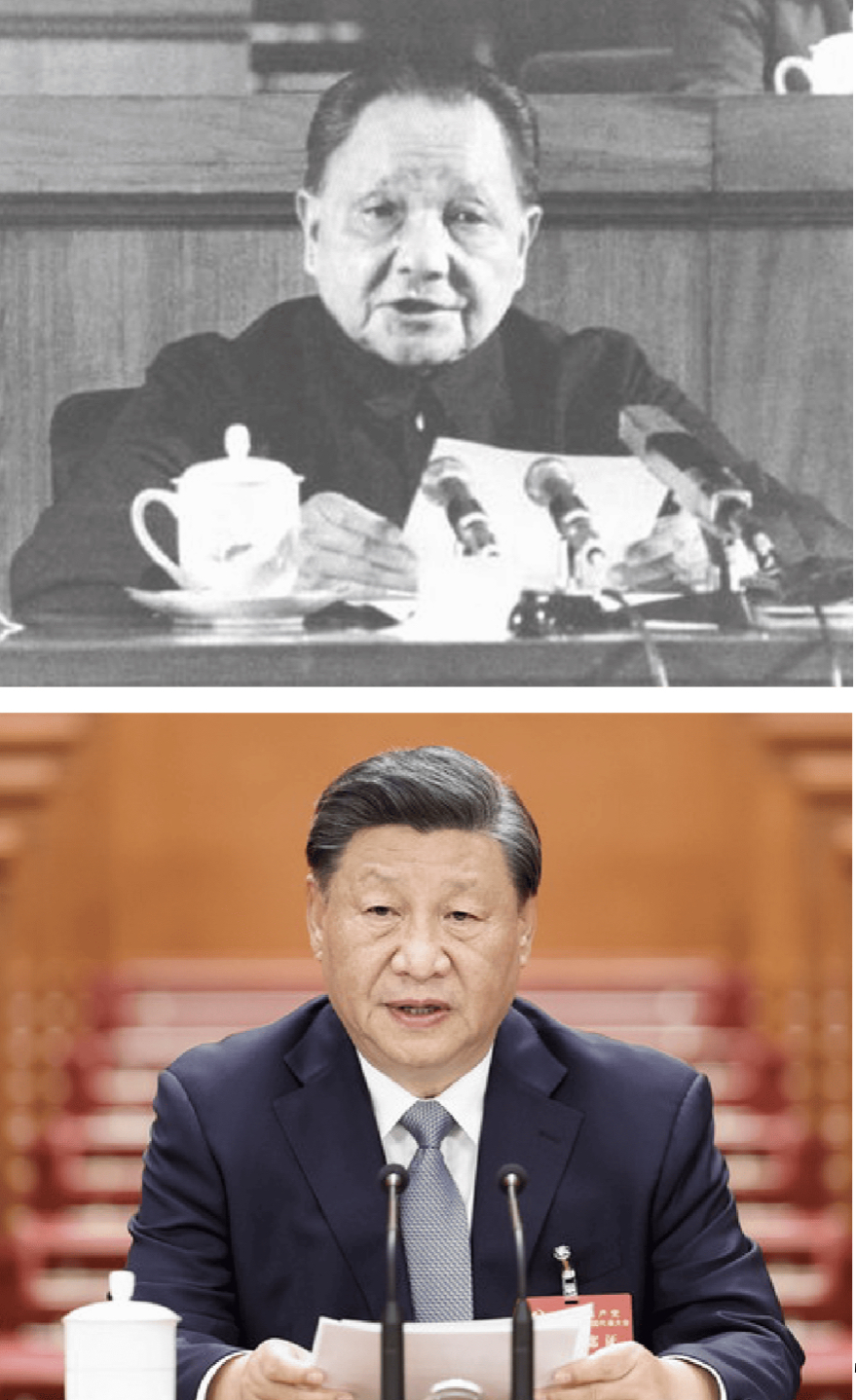
***
Then we had Xi Jinping’s move toward techno-totalitarianism and isolation, which we are still absorbing. His intentions were telegraphed all along, but they became crystal clear – even to China’s apologists – at the conclusion of the 20th National Communist Party Congress in October 2022. Since 1978, when Deng Xiaoping took over the reins, China had been a developmental state. China was rising. It was an astonishing story of human flourishing. Xi Jinping has said, No, we are not a developmental state. We are a highly ideological security state.
It is a fundamental narrative change and we are still soaking it in. It is the reason that Canada, Europe, more and more countries in East and Southeast Asia, are drawing closer to American-style skepticism of China. The Chinese people are self-insuring, saving money, getting their money out, because they, too, are onboarding the fact that they no longer live in a country that prioritizes development. But that doesn’t mean the more liberal Chinese strand has vanished.
Q: Can you say something about your relationship with Henry Kissinger and your role as director of the Kissinger Institute at the Wilson Center?
A: Many people assume that the Kissinger Institute is led by or in some sense reports to Henry Kissinger, which is not true. Dr. Kissinger has been helpful to us on a number of occasions. I first met him, not at the Wilson Center, but in 1997 when Chinese Communist Party leader Jiang Zemin came to the United States. That was a big trip. In those days, when Chinese leaders came to Washington, they would make a major policy speech. Kissinger hosted Jiang’s speech on U.S.-China relations and I was hired to interpret for Dr. Kissinger. He made opening remarks in English and I rendered his welcoming remarks into Mandarin. This put a gun to my head because there were a lot of people in the audience whose Chinese was as good as mine, who would know if I screwed up. This was when President Clinton and Jiang were talking about a constructive strategic partnership for the 21st century. The question of the moment was: what on earth does this mean?
What is Kissingerian about the institute is our guiding belief that management of bilateral relations must be founded in historical and cultural knowledge of both China and the United States. It must be founded in knowledge of the history of the relationship itself.
***
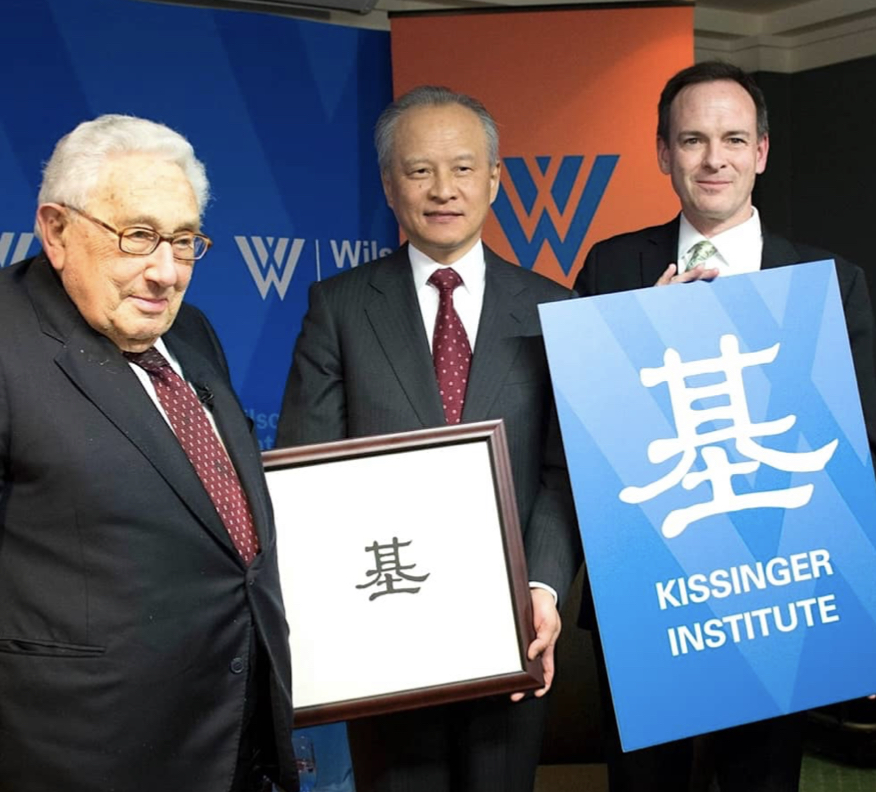
***
Washington policymakers often begin by asking “What do we want the other country to do?” The prior question is why does the other country see its interests and position in the world in the way it does? What is its historical experience and cultural background? What are its myths? We focus on that at the Kissinger Institute. We emphasize Chinese-language sources and discourse. We think that cultural and higher educational factors are important and too often overlooked in public discussions of the relationship. Security, economic, and technological issues are, of course, vitally important, but we won’t get China policy right unless we look at China through a broader, more humanistic lens.
Q: You are an old-fashioned public intellectual. How do you view your role in our field, and what element does your Catholic upbringing and faith play?
A: I might be old-fashioned, but I’m not an intellectual. I like graphic novels and pop music.
The faith question is hard to answer, but it may be what inclines me to view China in a humanistic context. We now view China, almost exclusively, as a security threat, but we used to approach it in a spirit of curiosity, with fellow-feeling and openness to the new. The view of many of us who have lived in China for years, and who have experienced its complexity and dynamism, is that we should give as much attention to the welfare of individual Chinese as we do to our security concerns. What Xi has made of China is heartbreaking as well as dangerous.
***
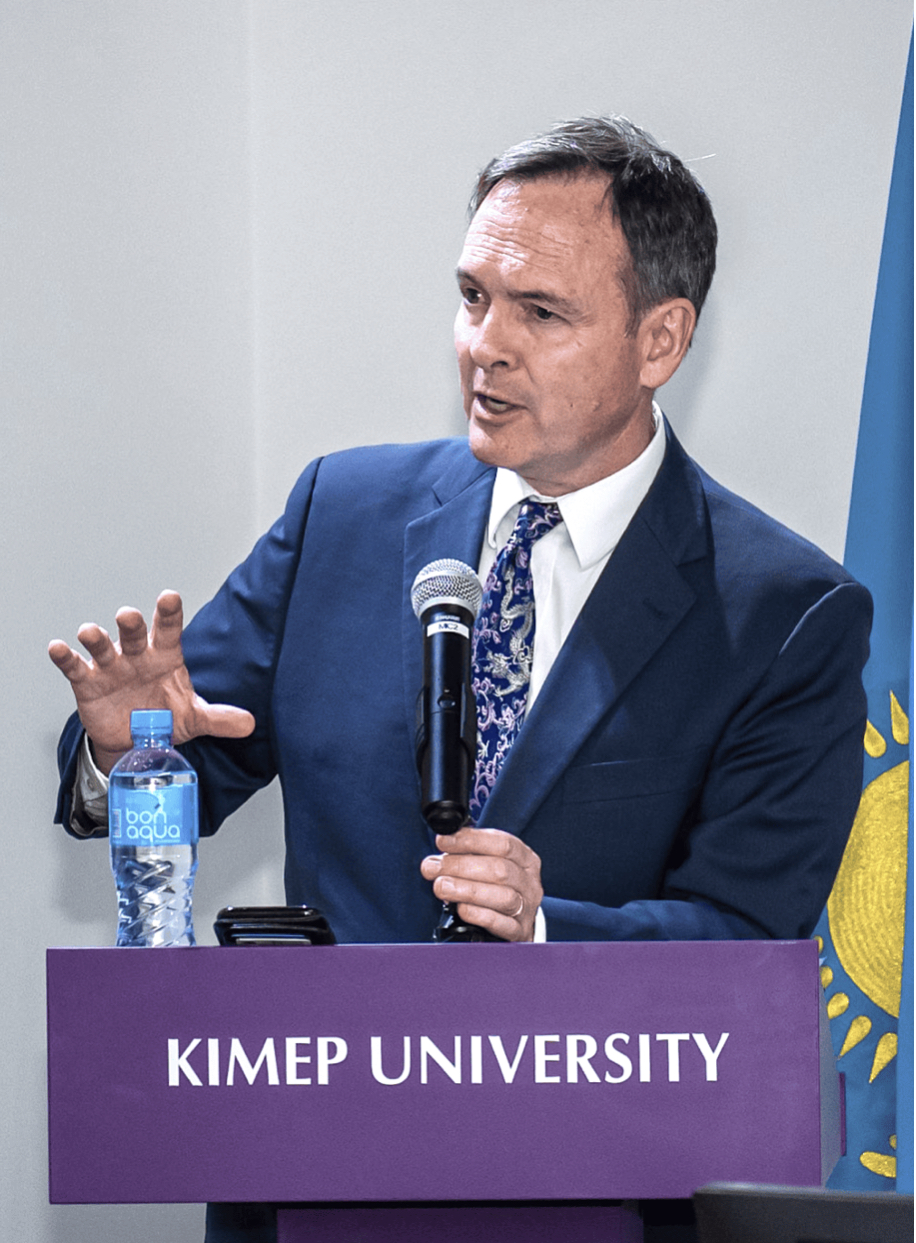
***
Because we fear China – often with good reasons – we are in danger of seeing it, as we have in the past, as a land of brainwashed automatons, as a hive-mind, as the Borg, bent on our destruction. We need to remember that China is still changing in unpredictable ways, and that it is made up of ordinary people. I know that sounds trite and sentimental – and preachy – but if we lose track of China’s humanity we will come closer to war. That is why I ask my students and people I work with in corporations and universities, and especially on Capitol Hill, to conduct a thought experiment: Any time you are reading an article on China and encounter the word “China” or “Chinese,” replace that with “one-fifth of humanity” and see how that changes your response. This won’t solve our problems in the South China Sea, but it may balance our perspective.
I am not saying China isn’t our greatest geostrategic challenge. It is. But there is a lot of over-the-top rhetoric and gross mischaracterization in our discussion of China. And there is something else in our approach – perhaps in our attitude – that worries me. I sense, and many of my friends and colleagues sense, a low level, constant current of racism running through our otherwise justified discussions of the challenges emanating from China. I’m not talking about the outright racism that results in old women being attacked on the streets of New York or San Francisco. I mean a lurking, unstated us-versus-them yellow peril-ism that imbues our framing of the China threat.
Q: The CCP already claims that there is nothing to America’s threat perceptions of China but American racism and America’s desire to maintain its hegemony. That’s nonsense. I don’t want to feed that beast.
A: I have never raised this publicly, for two reasons. The first is that I can’t prove it. As soon as I say there is an element of racism in our China discourse, people will say, where is the evidence? Show me. And I can’t. I just sense it as an ingredient in the mix. It is dangerous to raise the specter of racism without proof. But if we wait until the proof is incontrovertible, it will be too late.
The second reason I haven’t said this until now is that I don’t want my words used by the Communist Party for anti-American propaganda. The CCP already claims that there is nothing to America’s threat perceptions of China but American racism and America’s desire to maintain its hegemony. That’s nonsense. I don’t want to feed that beast.
***
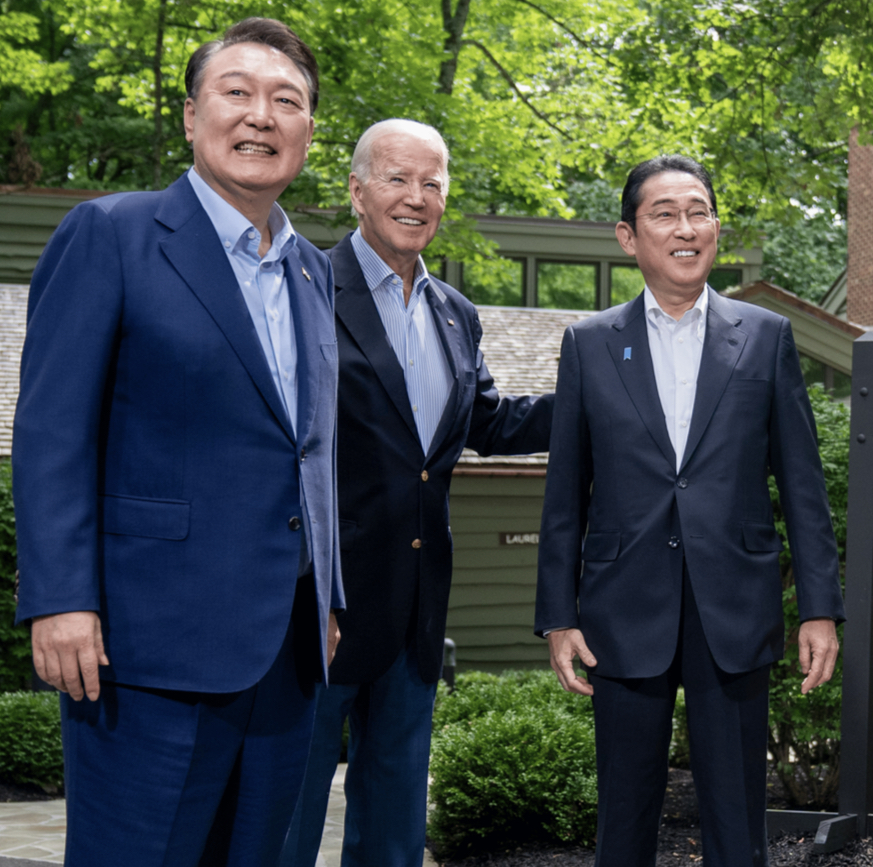
***
But the racism is there and is becoming more dangerous. Look at these state laws banning non-citizens from buying real estate in the name of combatting the Chinese Communist Party. One challenge which everyone who follows this relationship for a living faces is: how can we accurately describe this worsening relationship and the dangers of Xi-ist totalitarianism without contributing to anti-Chinese-American and anti-Asian-American racism. Even if you make all of the necessary disclaimers – and most of us do – there is almost no way to ensure that declining relations don’t lead to increasing racism.
China is also racializing the rivalry. In China you don’t have people beating up little old American ladies in the street. But there is an increasing discourse in China about “Anglo-Saxons” and their inherent violence and hegemonism. We see the CCP’s racism in Foreign Minister Wang Yi’s odious remarks before the Camp David summit, when he said to Japanese and Koreans: “No matter how blonde you dye your hair, no matter how sharp your nose gets, you will never be white.” He was calling them race traitors.
[Editor’s Note: Wang Yi’s remarks bring to mind a famous line from Lu Xun: 人不能揪著自己的頭髮離開地球. It was a part of the writer’s attack on the ‘third kind of person’, or writers who tried to avoid entanglement in the partisan literary and political feuds of the day. Lu Xun declared such a position to be untenable, as impossible as levitating just by tugging your own hair. Wang was also possibly alluding to the 脱亜入歐 datsu A nyū Ō policy of Japan in the late-nineteenth century that positioned the country to ‘slough off Asia, become part of Europe’.]
Q: What can we read into the recent high-level personnel changes in China? The sudden removal of Xi Jinping’s ally Qin Gang as Foreign Minister, the purge of the two highest-ranking generals in charge of China’s nuclear missile arsenal, and the disappearance of Defense Minister Li Shangfu?
A: Xi Jinping has made a series of very bad judgments. For much of his first ten years, the myth that was broadly bought into in China was that he was all-knowing, all-seeing, and perfectly wise. The quintessence of the Confucian Sage. He also posed as Connoisseur and Protector-in-Chief of China’s sacred language and culture, despite scant evidence that he’s versed in these things. But within China, and to some degree outside of China, this was bought into. We then had the whole “Uncle Xi” phase of presumed folksiness – a quality I never saw in him. And there was a great deal of writing in the peak-Xi Jinping era about Xi’s charisma and charm. Xi’s charisma? What are they talking about!
[Note: For my remarks on the ‘all cult and no personality’ enterprise of the Communist Party, see Xi’s Big Show, Foreign Affairs, 6 February 2022.]
***
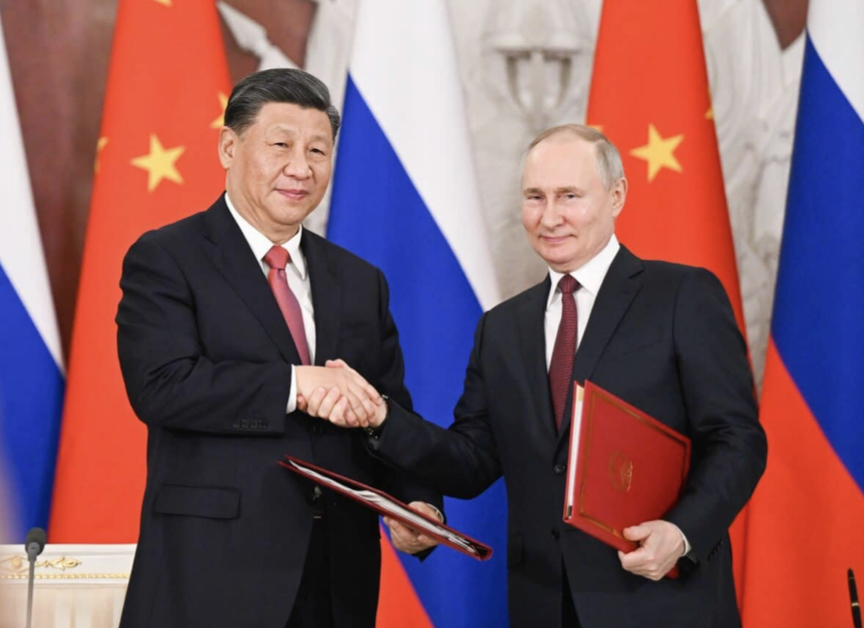
***
But with China’s COVID lockdowns, the sudden reversal of those policies, and the desperate state of the Chinese economy, the bloom is off the Xi Jinping rose. China’s reputation in much of the world has suffered under Xi’s leadership. The crowning disaster of Xi’s foreign policy was his decision to partner with Putin and double down on support for Russia’s invasion of Ukraine at every opportunity since. Even prior to that, China was isolated not only from the United States, but from developed democracies all over the globe. China’s Indo-Pacific neighbors – who value their economic relations with China – are not interested in greater Chinese influence. They prefer the United States as an offshore balancer.
So Xi has failed repeatedly, and now it’s very clear that even his intra-Communist Party political judgment is flawed. Qin Gang, the Rocket Corps generals, Defense Minister Li Shangfu – these are only his most public personnel misjudgments, and these are his people put in place recently. Apparently there is no vetting process.
His public failures of judgment are consequential for the Communist Party itself, for China’s foreign policy, for the well-being of the Chinese people. I am told that there is constant grousing in China about his leadership.
***
CGTN video of Xi Jinping visiting villagers in rural Shaanxi, September 14, 2021. Credit: CGTN
***
I’m not espousing a theory of collapse or revolution. It appears that there is still a lot of support for Xi Jinping. Certainly nobody sees a practicable alternative to his leadership. He lost the intellectuals and the creative class a long time ago. But it appears that in the PLA, the security services, and among blue collar workers, agriculturalists, second and third tier cities, Xi Jinping still has strong support.
But that support does not mean the people of China understand and approve the direction he’s taking the country in. Those are two different things. I have spent a lot of time over 33 years with mostly urban, educated, well-informed, ambitious, patriotic, internationalized Chinese. Their vision was a China that was spoken of admiringly along with Tokyo, Seoul, Paris, London, Milan, New York and Los Angeles. And Xi Jinping is giving them Moscow, Tehran, Pyongyang, Havana and Caracas. This is not what the people envisioned. This is not what they’ve been working for.
If we want to know how China is going to change, we should direct our attention to women. I do not say that to be politically correct; women are clearly the change agents in China. You see this in the non-death of the #metoo movement, even though it hasn’t yet won a single case. You see it in female stand-up comics who are mocking the patriarchy and filling bars. You see it in female rock groups who are doing the same in growing numbers. Men sometimes walk out in anger, but men also stay and come back for more.
Most importantly, women have found a way to control their fates and maximize their agency that even Xi Jinping and the Communist Party can’t do anything about. They are voting with their marriageability and fertility. This is a major development. We need to watch these social fissures. We need to watch the 躺平 [tangping – “lying flat”] and 摆烂 [bailan – “let it rot”] phenomena – young Chinese dropping out of mainstream society because their ideals cannot be achieved.
One aspect of this that must gall Xi Jinping is that the #metoo movement, standup comedy, rock concerts – none of these are of Chinese origin. These are all Western cultural influences.
For Xi, these cultural forms, as aspects of the United States, of the West, of the Enlightenment, are an existential threat to the Communist Party. This may prove to be true. But, so far, the CCP’s leadership has proven to be pretty resilient.
***
Scott Savitt is a former foreign correspondent for The Los Angeles Times and United Press International in Beijing. His articles have been published in the Washington Post, Wall Street Journal, New York Times, and others.
***
Source:
- Scott Savitt, Robert Daly on Keeping Close to China, The Wire China, 16 October 2023

